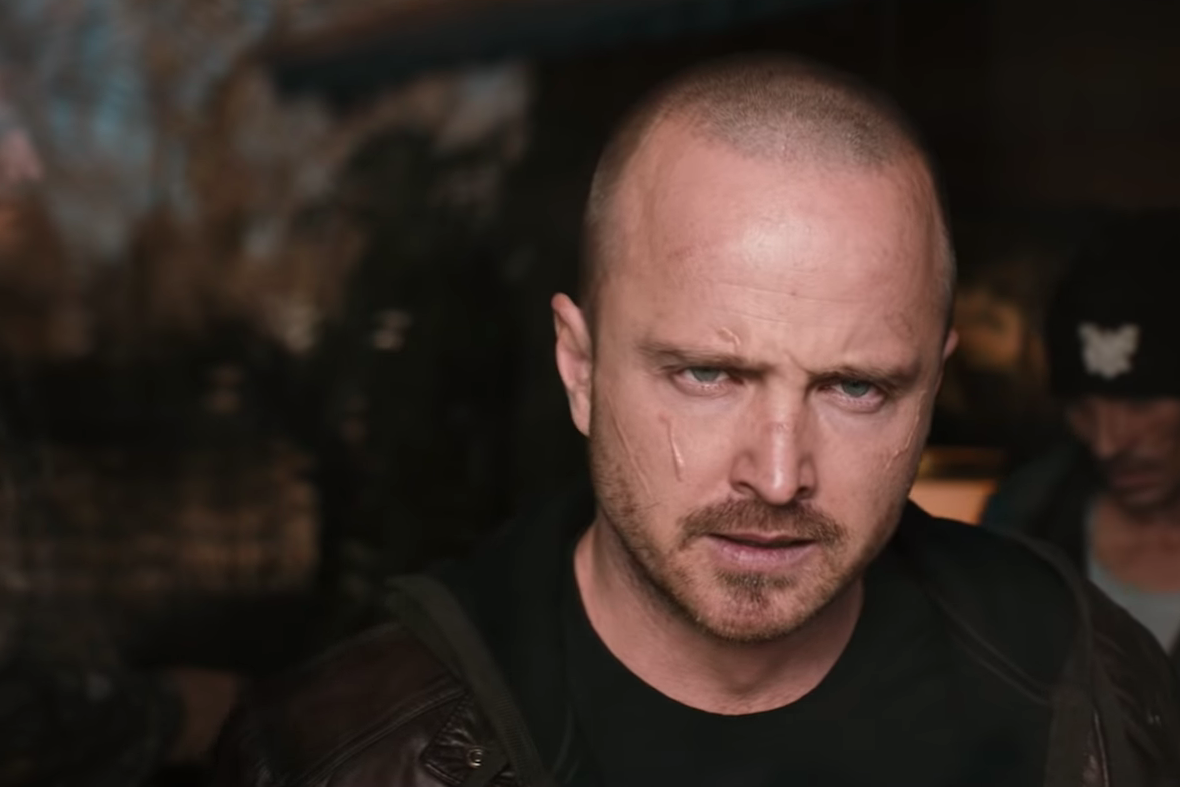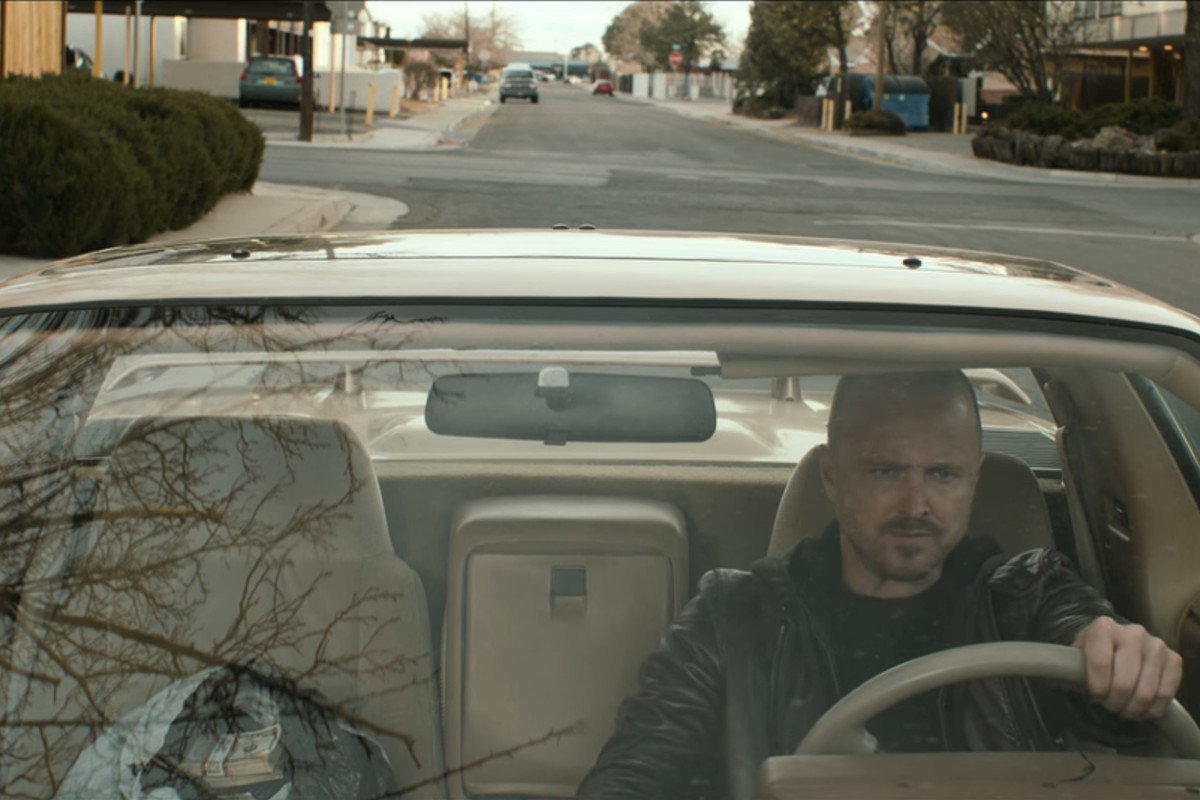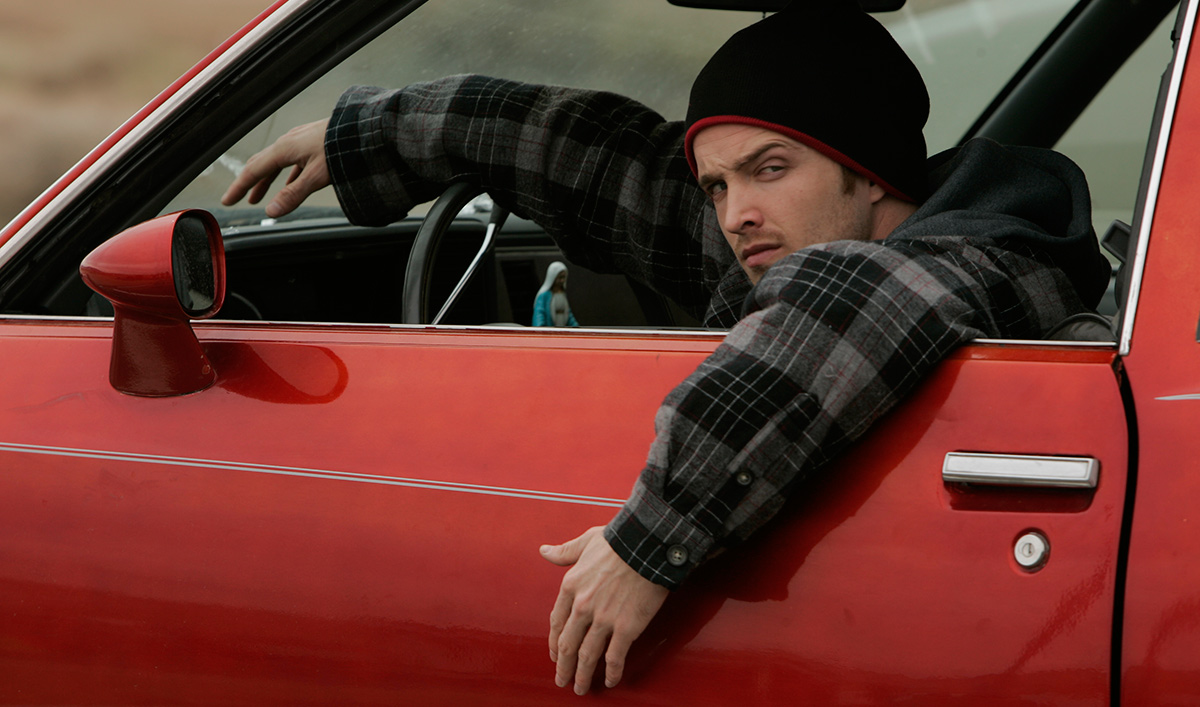Breaking Bad was a grandfather of so-called “peak TV,” among whose tenets is that a TV show can look as good as a movie while still retaining what’s best about long-form narrative. Interestingly, both of these elements do a disservice to El Camino: A Breaking Bad Movie, which has just dropped on Netflix as a way of wrapping up the story of co-protagonist Jesse Pinkman (Aaron Paul) after the meth epic’s last episode in 2013.
For one, the aesthetic Breaking Bad helped pioneer continues to be used here, which allows for good continuity, but has inevitably shrunken the proceedings a little bit – now it’s a case of a movie looking like it’s a TV show, rather than the other way around. It’s a bit paradoxical that we wouldn’t want this, since many Breaking Bad viewers considered the show superior to any movie experience they could imagine themselves having. But when you come right down to it, something that’s sold to us as a movie should have a kind of grandeur that a TV show rarely has – even a TV show as superlative as Breaking Bad.
A second beloved aspect of the show was the way series creator Vince Gilligan (who wrote and directs this movie) parcelled out information to us deliberately. A character – Jonathan Banks’ Mike Ehrmantraut, usually – could be involved in some kind of obscure project for an entire episode before we’d get any idea what he was doing. That kind of thing doesn’t work in a movie. And yet Gilligan continues that sensibility here, which results in a two-hour and two-minute movie where not all that much happens. If he wanted to use that approach, he should have made this a four-episode mini season – if it needed to be made at all.
He flops into bed like a felled pine tree, asleep before his head hits the pillow. It’s a reminder to us of what kind of week – and month – and year – he’s been having, plus how much more may be required. His next step is to go into hiding, but what form that hiding will take, how much money it will require, and how he will accumulate that money remains to be seen. That’s what El Camino the movie will show us, as well as flashbacks to scenes we hadn’t previously witnessed, with characters who are long since dead in some cases. Chronological playfulness is another Gilligan trademark.
The two most important principals in El Camino – Aaron Paul and Vince Gilligan – have spent their last six years very differently. Paul has tried to transition to the movies, but has found that a less welcoming landing spot than his former co-star, Bryan Cranston, has found it. Gilligan, on the other hand, has been making the Breaking Bad spinoff Better Caul Saul, which has experienced zero dropoff in quality and creative derring-do from its progenitor. Being away from this world has been a hindrance on Paul, but remaining close to it may hinder Gilligan in a different way, as El Camino might benefit from the perspective of a little creative distance.
Simply put, Paul seems to have forgotten how to play Jesse Pinkman. There are certainly touches of the Jesse we know here, but more often than not, it feels like a different actor doing a Jesse Pinkman impersonation. Much is made of the fact that Jesse is shell-shocked, but Paul only plays him like that in a few scenes. That would be okay if he defaulted back to the type of sneering indignation that so regularly characterised the man, broken up by occasional spells of clear-eyed morality, but Paul can’t find that mode either. Instead he’s just giving us a generic hunted criminal with more doses of good than bad.
In one particular scene that’s as much a fault of the writing as the acting, Jesse finds himself in a predicament involving men who pass themselves off as police officers. His realisation that they aren’t is so clumsily verbalised that it verges on parody. What allowed Jesse and Walter White to excel for so long on the show was how little they needed to verbalise; how much they instinctively grasped the stakes of a situation, often with little more than a shared moment of eye contact to communicate each other’s intentions.
And that’s on Gilligan. It seems he’s reserved the delicious complexities of his craft for Bob Odenkirk et al on Saul, or at least that would be the generous explanation for the story he’s given us here. It walks and talks like Breaking Bad, but with all the intrigue squeezed out of it. Breaking Bad was addictive because it pushed the envelope on what we could handle in terms of danger to characters we loved, so a Breaking Bad movie should tighten the screws on that pressure cooker. It’s frankly puzzling, then, how much time Gilligan fritters away on the screenwriting equivalent of wool-gathering. Logistical details are assembled toward narrative payoffs, but these payoffs never arrive. Tangents prove fruitless. New antagonists are introduced and peter out limply. This movie seriously needs a Gus Fring, but there isn’t even a Tuco Salamanca.
Perhaps the most crucial narrative sin is Gilligan’s failure to sustain tension. The most obvious prospect for that tension is the fact that a major manhunt for Jesse is underway. However, Gilligan never gives a face to the police by selecting a character to function as the grizzled detective determined to find his man. Perhaps that’s because the police basically drop out of this story, becoming absent when they should be omnipresent. In Pulp Fiction, it was a miracle that Butch could stroll back into his apartment to retrieve his watch, as the men searching for him should have been guarding every entrance. El Camino is like that same miracle occurring for Jesse over, and over, and over again, except without some version of Butch’s necessary comment acknowledging the unlikelihood of the whole thing.
Maybe El Camino itself was too unlikely ever to be satisfying. Gilligan surely thought he could make a “what happened to Jesse Pinkman?” story compelling, but he also seems like the type of creative mind who would balk at excess fan service. Movies like Solo: A Star Wars Story deserve our scorn for filling in blanks we never wanted filled, and unfortunately, to a lesser degree, so does El Camino. Before this movie existed, a crazed Jesse driving off into the next chapter of his life let us write a happy or tragic ending as we saw fit. To quote Adam Driver’s character in While We’re Young, who shuts down an attempt to google a trivia answer: “Let’s just not know.”



